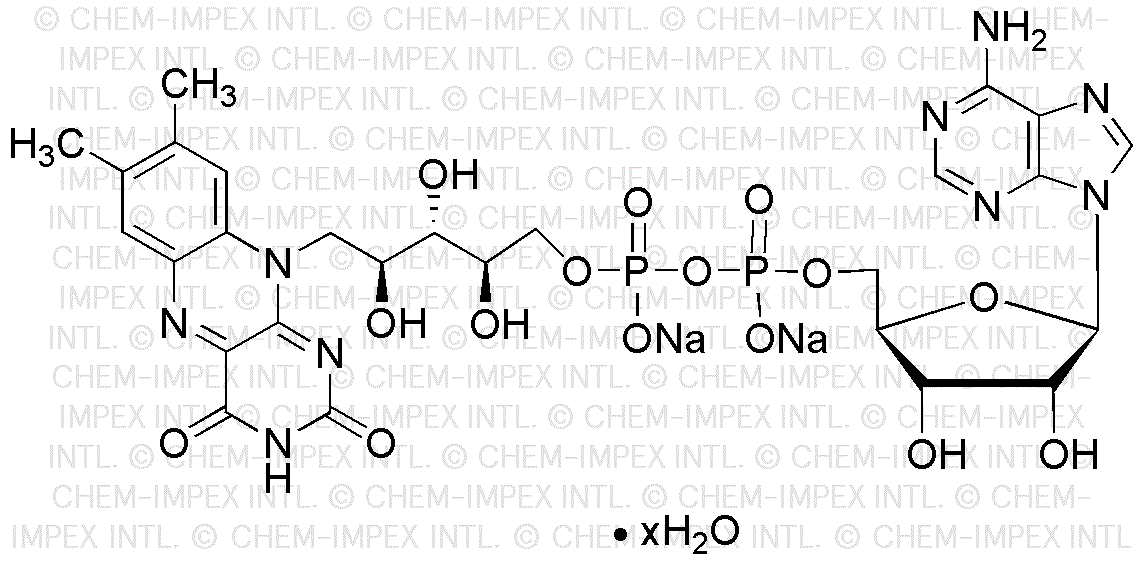Flavin adenine dinucleotide disodium salt hydrate is widely utilized in research focused on:
- Biochemical Research: It serves as a crucial cofactor in various enzymatic reactions, aiding researchers in studying metabolic pathways and enzyme kinetics.
- Cellular Studies: This compound is essential for cellular respiration and energy production, making it a key component in experiments related to mitochondrial function and cellular energy metabolism.
- Pharmaceutical Development: It is used in drug formulation and testing, particularly in the development of therapies targeting metabolic disorders, due to its role in redox reactions.
- Diagnostics: The compound is utilized in diagnostic assays to measure enzyme activity, providing valuable insights in clinical settings for conditions related to energy metabolism.
- Food and Nutrition Science: It plays a role in studying the nutritional aspects of flavins in food products, helping to understand their impact on human health and dietary requirements.
General Information
Properties
Safety and Regulations
Applications
Flavin adenine dinucleotide disodium salt hydrate is widely utilized in research focused on:
- Biochemical Research: It serves as a crucial cofactor in various enzymatic reactions, aiding researchers in studying metabolic pathways and enzyme kinetics.
- Cellular Studies: This compound is essential for cellular respiration and energy production, making it a key component in experiments related to mitochondrial function and cellular energy metabolism.
- Pharmaceutical Development: It is used in drug formulation and testing, particularly in the development of therapies targeting metabolic disorders, due to its role in redox reactions.
- Diagnostics: The compound is utilized in diagnostic assays to measure enzyme activity, providing valuable insights in clinical settings for conditions related to energy metabolism.
- Food and Nutrition Science: It plays a role in studying the nutritional aspects of flavins in food products, helping to understand their impact on human health and dietary requirements.
Documents
Safety Data Sheets (SDS)
The SDS provides comprehensive safety information on handling, storage, and disposal of the product.
Product Specification (PS)
The PS provides a comprehensive breakdown of the product’s properties, including chemical composition, physical state, purity, and storage requirements. It also details acceptable quality ranges and the product's intended applications.
Certificates of Analysis (COA)
Search for Certificates of Analysis (COA) by entering the products Lot Number. Lot and Batch Numbers can be found on a product’s label following the words ‘Lot’ or ‘Batch’.
Número de catálogo
Número de lote/lote
Certificates Of Origin (COO)
This COO confirms the country where the product was manufactured, and also details the materials and components used in it and whether it is derived from natural, synthetic, or other specific sources. This certificate may be required for customs, trade, and regulatory compliance.
Número de catálogo
Número de lote/lote
Safety Data Sheets (SDS)
The SDS provides comprehensive safety information on handling, storage, and disposal of the product.
DownloadProduct Specification (PS)
The PS provides a comprehensive breakdown of the product’s properties, including chemical composition, physical state, purity, and storage requirements. It also details acceptable quality ranges and the product's intended applications.
DownloadCertificates of Analysis (COA)
Search for Certificates of Analysis (COA) by entering the products Lot Number. Lot and Batch Numbers can be found on a product’s label following the words ‘Lot’ or ‘Batch’.
Número de catálogo
Número de lote/lote
Certificates Of Origin (COO)
This COO confirms the country where the product was manufactured, and also details the materials and components used in it and whether it is derived from natural, synthetic, or other specific sources. This certificate may be required for customs, trade, and regulatory compliance.


